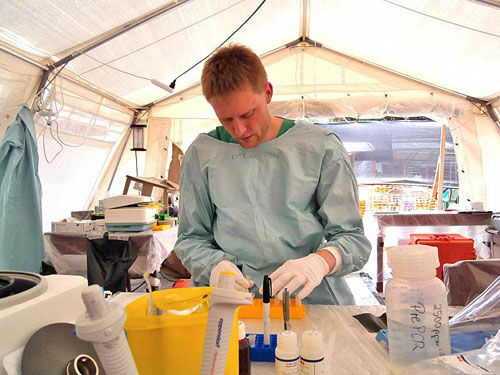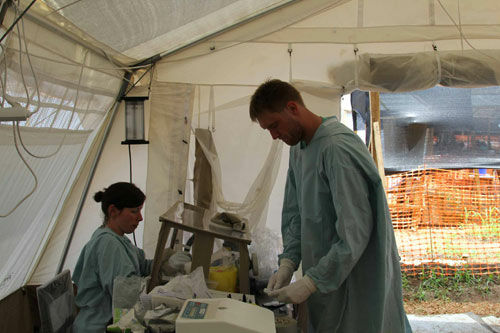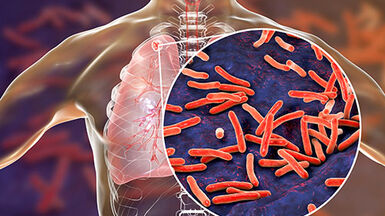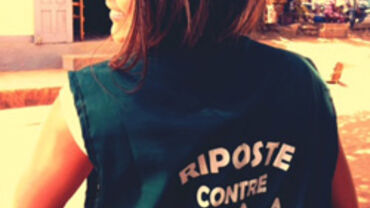Laboratory Support Mission: Fighting Ebola in Guinea
Zoltán Kis is a pharmacist by training, with a specialization in international public health. He completed his PhD at the Szeged University and has been working at National Center for Epidemiology, Hungary. He is currently a Cohort 2013 Fellow in the Member State Track of the EUPHEM program and has remained in his position at the Centre for Epidemiology for the duration of the fellowship. He is also a trained member of the European Union Mobile Laboratory (EMLab) for rapid deployment in complex emerging situations. Zoltán shares his experiences from his recent mission to Guéckédou, Guinea.

What was the mission about?
In early March 2014, the Ministry of Health of Guinea and Médecins sans Frontiéres (MSF) were alerted about a cluster of a mysterious disease characterized by fever, severe diarrhoea, vomiting and a high fatality rate. The virological analysis conducted in Germany and France revealed that the Ebola virus was the causative agent. This is the first Ebola outbreak in Guinea.
The World Health Organization (WHO) launched an international response, with the support of the Global Outbreak Alert and Response Network (GOARN) and other partners, in order to assist the Ministry of Health of Guinea in controlling the outbreak. EMLab offered to deploy its Mobile Unit from Munich to Guinea. WHO accepted the offer and the first team was deployed to the field in Guéckédou.
What did the team do?
The EMLab team provided the diagnosis of Ebola viral diseases at field level in the context of the current outbreak. In addition, EMLab gave advice regarding the collection of specimens, and helped in the interpretation of data in close collaboration with national and international laboratory staff and counterparts. We worked in close cooperation with MSF, as the laboratory was deployed in the Ebola isolation centre maintained by MSF. MSF really appreciated our work as within 4 hours we simultaneously provided malaria and Ebola diagnostics to newly admitted patients helping them to rapidly treat patients and organize the isolation centre capacity (to discharge the patients or to admit into the confirmed cases tent). Using skills gained through the EUPHEM BQM module, we also organized safe BSL4 specimen transportation to send samples back to Europe for further characterization.

What was your experience?
This was my first experience of a Sub Saharan African country so the living conditions, the environment, the situation due to the Ebola outbreak were a little daunting. But I am happy to say that everything went well! Although poverty is strongly present, the local people always had a smile on their face and were very helpful and friendly.
The team members were from all over Europe, bringing with them great experience and I felt honoured to work with such a dedicated and efficient team. We were the second EMLab team to be deployed and very motivated to contribute to defeating this terrible disease. Not everything was easy to handle though: we frequently worked on samples from recently admitted patients, only to hear in the following days that they had passed away. I do remember one particular case, however. A young boy with severe disease survived Ebola after rapid diagnostics and treatment and was subsequently discharged to go back home. This particular case raised all of our spirits!
What have you learned?
This mission was very useful for me, it is a very important milestone in my life. It was tough but I gained lots of experience and my perspective on field work has become wider. Working in a field laboratory is completely different from working in our BSL4 lab.
I learnt how to process specimens containing one of the deadliest viruses under very basic conditions and how to manage unforeseen situations such as electric shortages during laboratory procedures and receiving broken blood collection tubes! I also appreciated having to work in limited place, while trying to use limited resources in the most efficient way. Working under time pressure, and the big responsibility and difficult environment influenced my daily mood. During the contact tracing I also learnt how and what kind of communication techniques are used to communicate with the local population and how I can increase their awareness of the situation. All of this meant that at the end of our mission our team was forged into one functioning unit both professionally and personally.







